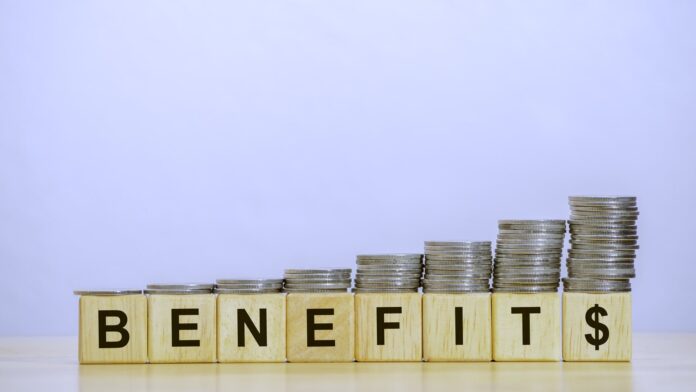Introduction
Sometimes people are wondering whether they should start investing in the stock market or just save money in their savings account.
While some individuals may be able to gather enough retirement savings to their bank account, there are many benefits to investing.
Although there are obviously other investments than stocks and stock market investments, this article (and this site) mostly focuses on stock investing.
Here we take a look at the three most important reasons why you should invest your money, and why investments are an important part of your financial planning.
Inflation
Having a savings account and putting money aside is always better than nothing. The problem is that, in the long term, time will destroy your capital.
I’ve written a bit about the effects of inflation before, so you might want to check that article for further information.
What is Inflation and Why it Matters
In a nutshell, inflation erodes your currency’s purchasing power by increasing the general price level. The higher the inflation, the less you can buy with your money.
For example, let’s imagine you had $100 in 1950 in the U.S. At the time, it would’ve bought you about 55 white dress shirts, 370 gallons of gas, or 400 packs of cigarettes. It also would’ve paid your rent for 1,5 months.
The $100 equals having $1,235.32 today. Now, the problem is that the $100 is just $100. If you would’ve saved that $100 under your mattress, it would still be exactly the same today.
So, compared to 1950, you won’t be able to buy nearly as much because the general price level has risen because of inflation.
Although inflation may feel like an abstract concept in short term, it truly does make a difference in the long term.
How to Beat Inflation
If you want to keep inflation from stealing your money, you need a return that’s either the same or preferably higher than the rate of inflation. For example, if inflation is 5% and you earn a 4% return, you’re actually losing 1% of your money.
The average inflation rate in the U.S. between 1950 and 2022 has been 3.55%. This means that for the past 70 years, you would’ve needed at least a 3.55% return for your money to break even.
When we look at S&P 500 index for the same period, the average rate of return has been 11.12% (including dividends). So, after inflation, you would still have a return of over 7%.
Investing in stocks has proven to be one of the best hedges against inflation because of higher returns.
One reason for this is the fact that companies can shift the rising manufacturing costs in their prices. So, in the end, consumers pay for inflation and companies gain higher cash flows.
Although there is a certain amount of risk you have to take when investing in stocks, I would say that the risk of not investing is always greater. If you keep your $100 in your money market account, there’s no risk of losing money because, thanks to inflation, it’s certain.
Compounding Returns and the Price of Not Investing
If there is one thing that truly makes a difference in finance as well as in life, it’s compounding. I’ve also written about the effects of compound interest before, so I won’t get too much into defining the term in this article.
Suffice it to say that compounding is the way that most successful investors build wealth. The problem is that while it’s a deceptively simple concept, compounding is not easy to achieve.
I believe that long-term investing is the best way to achieve compounding and thus exponential returns. When you reinvest the returns you get, you will eventually achieve compounding when your returns start to generate additional returns.
Achieving compounding takes a while, but the effect becomes stronger the longer you invest. This is one of the reasons why investing is such a great way to ensure your financial well-being when you retire.
The best returns often come after a few decades, so your investments will most likely pay off the most when you plan on retiring. That is also why you should begin investing as soon as possible.
The Returns You Throw Away
If you don’t invest or don’t gain any interest on your capital, there is no compounding. So, not only will you lose money through inflation, but you also lose whatever profits you could’ve achieved by investing.
For example, let’s compare a situation where you save $10,000 under your mattress for 30 years, and a situation where you invest that $10,000 for 30 years with an annual return rate of 8%.
In this example, I use real S&P 500 returns and the average inflation rate between 1991-2021.
After 30 years your initial $10,000 investment would’ve grown to $259,741, with an average return rate of 11.08% per year.
At the same time, with an average inflation rate of 2,32%, your $10,000 dollars would’ve had a buying power of $4,823 in 2021.
What we can learn from this is the fact that you not only lose your buying power because of inflation, but you also lose all the returns you would’ve made by investing your capital.
Choosing not to invest might be the most expensive decision you’ll ever make.
Be on the Winning Side
I believe that our current economic machine is built in a way that makes companies the winning party. No matter what you do or buy, your money flows to the companies and their owners.
Therefore, we can categorize people to consumers and creators. Creators supply goods and consumers demand them.
The way I see it, if you don’t invest, you’re basically just a middleman that carries money from a one corporation to another.
One of the biggest reasons why I became an investor was to benefit from the companies that benefit from my consuming. This way it’s possible to get the most out of the system without actually starting a company yourself.
Some might even say that it’s the smart thing to do.
Let Your Capital do the Work
Whereas companies use their products and labor force to create leverage for higher returns, an investor only needs his capital. The core idea of investing is to let your capital do the work.
When you own a stock, you own a piece of the company. Therefore, the company’s profits will eventually be your profits.
The beauty of investing is that your returns are not tied to the amount of work you do.
What I mean is that when you invest a certain amount of money in a successful company, your capital continues to work for you for decades to come. Your work, on the other hand, is mostly done when you’ve made the investment decision.
In other words, your returns are not equal to the work you do. So, if all goes well, you’ll get more with less.
Summary
To summarize, the reason why you should invest is not only to build and maintain your wealth but also to use our economic system to your benefit.
Although you should invest a certain portion of your assets, it’s also important to keep some money in your savings account as an emergency fund.
Also, there are other investments besides stocks that, depending on your investment strategy, might be equally suitable.
Personally, I think investing in stocks is the best way to build wealth in the long term.
There are, of course, numerous investment vehicles you can choose, depending on your financial goals and how much risk you’re willing to take.
Depending on your financial goals and personal risk tolerance, it might be suitable to allocate a portion of your capital to fixed income investments.
If you’re about to start investing and aren’t sure what you should do, it might be best to consult an investment advisor.




